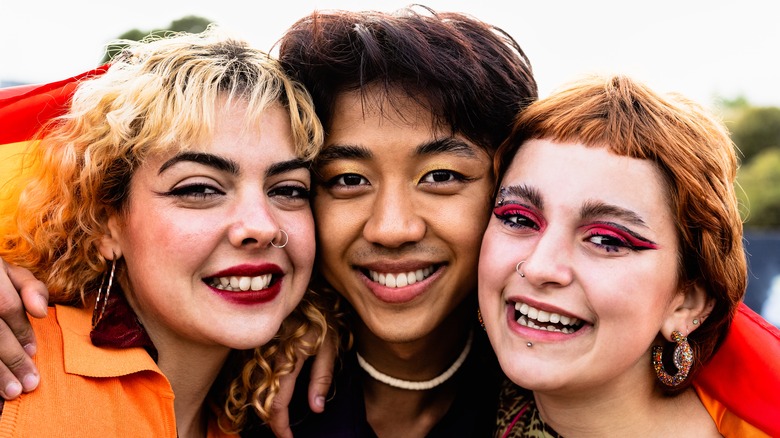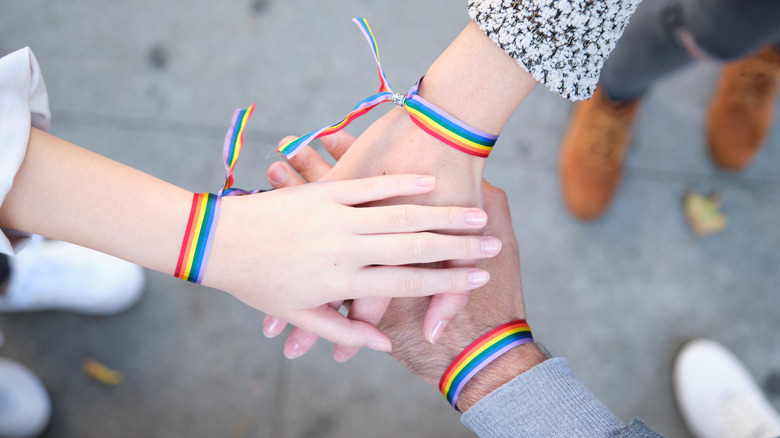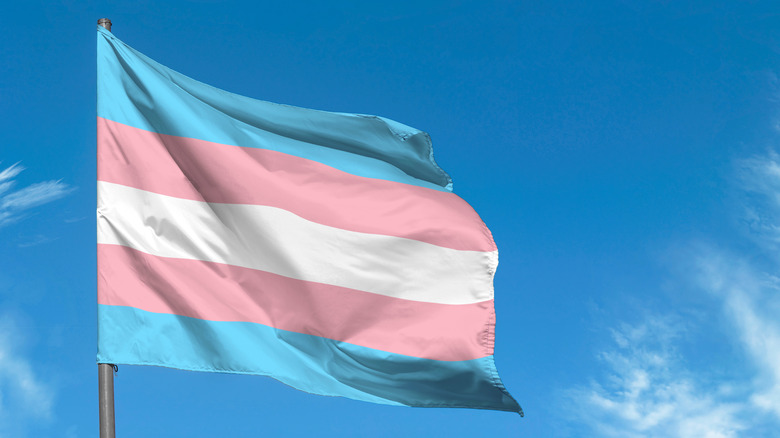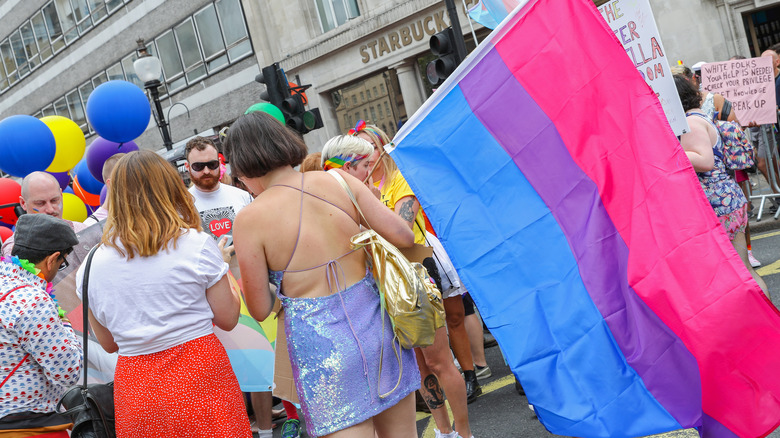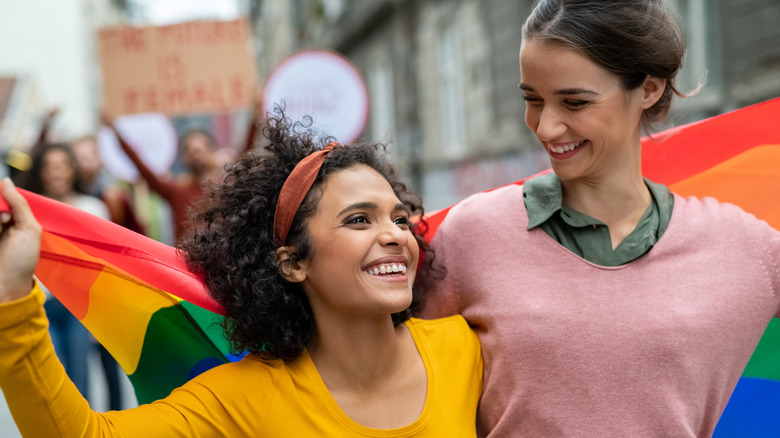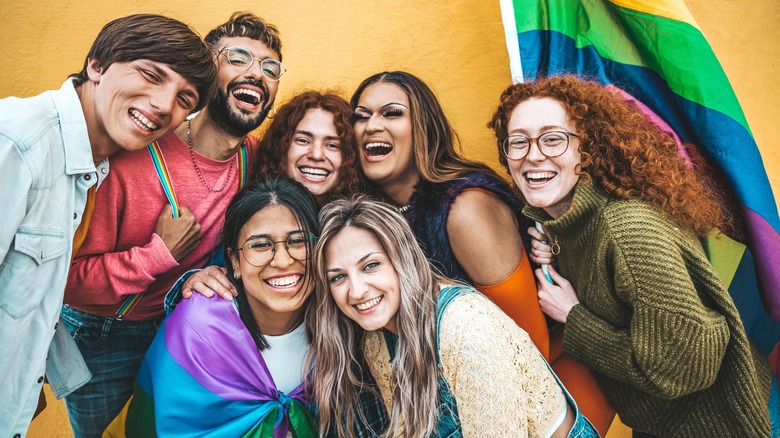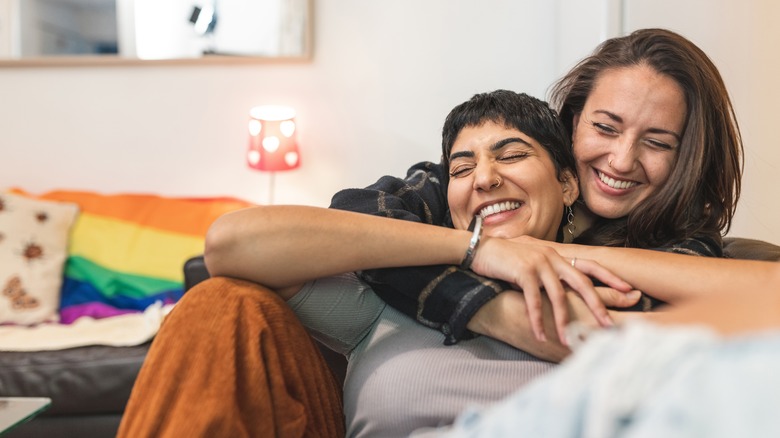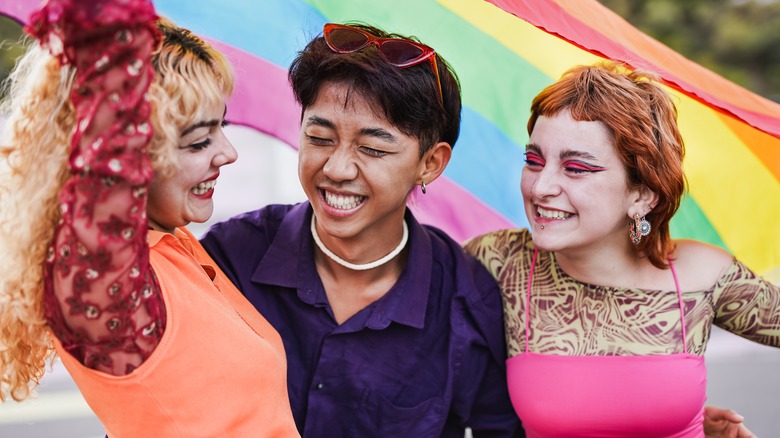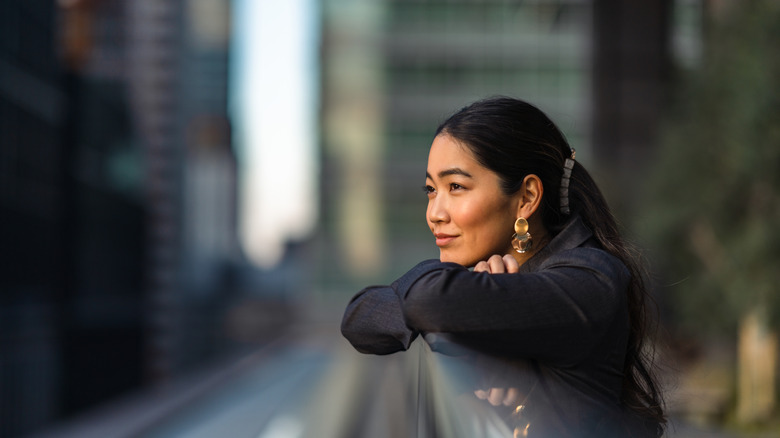We're Busting 10 BS Myths About Bisexuality
Like many things in life, sexuality exists on a spectrum. Not only does this mean that it is sometimes impossible to neatly categorize it, it also means that it can evolve over time. Bisexuality, as defined by GLAAD, refers to "the potential to be attracted romantically or sexually to two or more genders" regardless of one's own gender.
Despite the fact that more than half of all LGBTQ+ identifying adults in the US define themselves as bisexual, stigma against the orientation remains alarmingly common. Too often, people who disclose their bisexuality face pushback like being told, "Oh, but that's just phase," or "You're just confused." These dismissive comments reflect a misunderstanding that people in and outside of the LGBTQ+ community harbor about bisexuality. This has perpetuated a culture of biphobia and bi erasure, which has negatively impacted members of the bisexual community. Research by the Human Rights Campaign indicates bisexual individuals experience levels of anxiety and depression at greater rates than others, even when compared to their LGBTQ+ peers.
With Pride happening this month, taking the time to learn about the complexities and challenges of various sexual identities is one of the best ways to serve as an ally to the LGBTQ+ community. On that note, let us put to rest some of the most harmful myths about bisexuality.
Myth: Bisexuality is just a trend
While some folks may come out as bisexual before identifying as gay, lesbian, heterosexual, or otherwise, let's make one thing clear: bisexuality itself is its own distinct orientation. In fact, according to the CDC's Youth Risk Behavior Survey shared by The Trevor Project, bisexual people account for 75% of young people who identify as part of the LGBTQ+ community.
Still, you may have heard people say that people who are bisexual are simply heterosexual and trying to be hip or trendy. These dismissive statements often happen in response to news about the increased number of people identifying as bisexual. However, it's a harmful to frame this information as if people are suddenly 'becoming' bisexual, as it implies it is a choice that one can put on and off. In reality, experts believe it's more likely that people are openly declaring themselves as bisexual because they have greater understanding or education about human sexuality, and therefore feel more comfortable coming out. Moreover, the increased number of people identifying as bi is likely a result of social attitudes moving toward being more accepting of LGBTQ+ lifestyles. People who may not have come out in the early 2000s as bisexual due to politics of the day may feel it is safer to do so now. Gallup editor Jeffrey Jones told Washington Post, "Certainly there's still some discrimination, but it's nothing like it's been when the older generations were growing up ... it's both things happening — the behaviors and the attitudes are changing, and it's also the population changing."
Myth: Being bisexual means you are only attracted to two genders
For years, people have heavily focused on defining bisexuality based on the prefix "bi," which refers to the number two. This has lead to an assumption that bisexual people are only attracted to cisgender men and cisgender women, which has caused many people to view the identity as exclusionary of nonbinary people and the trans community.
However, the term 'bisexual' has evolved significantly over the years, and is continuing to do so, with some now preferring the terms 'bisexual+' or 'bi+' to better reflect attraction to more than one gender. As AC Dumlao, a program manager at the Transgender Legal Defense & Education Fund told NBC News, "I think it's important for me as a trans nonbinary person to be out as bisexual and to explain and show people that there's no one way to be bisexual."
In April 2020, the Merriam-Webster dictionary changed its offiical definition of bisexuality from "attraction to both men and women" to: of, relating to, or characterized by sexual or romantic attraction to people of one's own gender identity and of other gender identities. This important definition change came thirty years after a bisexual literature, art, and media magazine in the Bay Area published a "Bisexual Manifesto," which described the identity in this way: "Do not assume that bisexuality is binary or duogamous in nature: that we have 'two' sides or that we must be involved simultaneously with both genders to be fulfilled human beings. In fact, don't assume that there are only two genders."
Myth: Bisexual women are actually straight, and bisexual men are gay
This myth heavily plays into homophobic ideas about same-sex attraction: the implication that bisexual women's attraction to other women somehow isn't to be taken seriously, while bisexual men's attraction to women is a cover for them being secretly gay. Both beliefs rely on an inaccurate, and wholly misogynist precedent: Everyone is attracted to cis men, but only cis heterosexual men are truly attracted to women. One 2021 study by The European Journal of Psychology confirmed this bias extends beyond straight men, with the majority of respondents feeling skeptic about men who claim to be bisexual, dismissing them as merely gay and in denial.
Although numerous scientific studies looking at human arousal have clearly debunked this myth through evidence that people can be sexually stimulated by multiple genders, it's worth noting that bisexuality encompasses more than just physical responses. People can feel attracted to multiple genders, or experience romantic attraction to one gender, and sexual attraction to the other. They can also feel romantic and sexual attraction to one or both genders. Moreover, some bisexual people may favor their same-sex attraction over heterosexual attraction. That doesn't make them any less bisexual, as the other attraction is still there. The bottom line is, it's not anyone's place to label someone else's orientation.
Myth: Being bisexual means you are open for threesomes or a polyamorous relationship
The threesome myth is closely linked to the myth of the 'bisexual unicorn,' a stereotype ascribed to feminine bisexual women as being eager and willing to engage in sex at all times without any emotional commitment. Even though some bisexual people may be fine with this, this assumption has unfortunately made it so some straight people think it's okay to objectify, solicit, and harass bi women against their consent. It also reinforces the idea that bisexual people exist merely to satisfy sexual fantasies of others, rather than as complete beings with complex attractions of their own.
Just as it is with gay, lesbian or heterosexual people, a bisexual person may be interested in a threesome or polyamory, but their sexuality doesn't guarantee it. All that bisexuality refers to is someone's sexual attraction to two or more genders. It does not define their interest in a particular sex act or activity.
Myth: Bisexual people are promiscuous and impossible to please
This myth is closely linked to the previous one as it conflates sexual orientation with action. People who identify as bisexual engage in a wide range of sexual behaviors — just like any other orientation. They may have no partners, one partner, or multiple partners. Unfortunately, there is a misconception that bisexual people, particularly ones who are in opposite-sex relationships, are likely to cheat on their partner. One 2016 survey of U.S. adults by The National Institute of Health found approximately one in five respondents believed bisexual people were incapable of being faithful in a relationship.
This belief stems from the stereotype that bisexual people are all hyper sexual and have insatiable libidos. And while there is nothing wrong with having a high sex drive, or even having multiple partners, it isn't accurate to say all bisexual people aren't interested in monogamous or long-term relationships. Per Reuters, one 10-year study from the early 2010s following the activity of bisexual-identifying women by the Journal of Developmental Psychology found nearly 90% of the respondents were in committed relationships.
Being promiscuous is no more common among bisexuals than it is with any other sexual orientation. Similarly, bisexual people are not more likely to cheat on their partners, nor are they any more likely to have a sexually transmitted disease. The Trevor Project lays it out plainly: "Liking more than one gender does not mean that you'll automatically be more sexually active."
Myth: You can only identify as bisexual once you have been in a relationship with both a man and a woman.
This misconception is a doozy because would a person say the same about someone who identifies as heterosexual? You cannot identify as straight unless you have been in a relationship with someone of the opposite sex? That's highly unlikely, because someone's heterosexuality isn't judged based off of their activity level or relationship history. The same standard should be applied to those who identify as bisexual.
Plenty of people know they are bisexual before they enter into any kind of relationship. Again, the distinction between desire and action is key to remember. Bisexuality has little to do with actions, and everything to do with a person's potential to be attracted to multiple genders, whether physically, sexually, or romantically. This means a person can definitely identify as bisexual even if they have only ever engaged physically or romantically with one gender. In addition, it's worth noting that no one has to 'prove' their sexuality, orientation or gender to anyone. No one has a right to demand that individuals behave in specific ways to uphold how they identify.
Myth: Bisexual women only claim this identity in order to gain male attention.
The fetishization of bisexual people, and particularly bi women is unfortunately quite common. From cis heterosexual male musicians singing about being turned on by seeing their girlfriends kissing girls, to self-proclaimed heterosexual women joking about experimenting with women after having a few drinks, bisexual women's orientations are frequently reduced by media to the status of kink or fetish.
Aside from being inaccurate, one glaring issue with this myth is it puts cisgender men's arousal, or the male gaze at the center of the narrative, instead of validating an individual's self-determination. Moreover, It assumes bisexual women's attraction to men is somehow more legitimate, while their attraction women and other gender's is secondary. This unfortunately perpetuates the idea that any queer attraction among women isn't to be taken seriously beyond the sexual aspect.
Bisexual people are not performing their sexuality for the sake of attention. The vast majority of people have put a lot of thought and energy into understanding their sexual orientation, so making it out to be a flippant decision to get attention takes away from those efforts.
Myth: Bisexuals are just confused
Along with being accused of attention-seeking behaviors, bisexual people frequently deal with having their identity dismissed as mere confusion or a 'phase.' This is not only frustrating and invalidating for bisexual people, but also completely inaccurate.
Unfortunately, heteronormative ideas about sexuality have conditioned some people to believe that a person can only be gay or straight. Even calling bisexual "in between" can be troubling as it implies it is the liminal space between identities, rather than a whole orientation on its own. Bisexuality is not merely a pit stop on the way from one end of the attraction binary to the other. It is a legitimate sexual orientation that deserves to be recognized and respected.
Equally worth addressing is that one's own bisexuality can evolve over time and one's attraction to different genders isn't always an even, 50-50 split. As psychologist Dr. Julia Shaw told BBC, "[bisexuality] is not being half gay, half straight." As pointed out by GLAAD, bisexuality is fluid, which means people may feel more attracted to one gender on a given day. That doesn't mean they are confused, nor does it negate their attraction to another gender. It simply means they are capable of experiencing attraction to multiple genders, which is exactly what bisexuality is.
Myth: All bisexual people benefit from straight passing privilege
Some people feel that many cisgender bisexuals have an unfair ability to choose when they want to be queer, because they experience the world being perceived as heterosexual. This stems from the inaccurate assumption that heterosexuality is the default and that people are straight until proven otherwise, which is a problem in itself. The sad reality is many bisexual people often feel alienated from both LGBTQ+ and heterosexual spaces due to feeling like they don't fit in either.
Of course, there is some legitimacy to the argument that people who present as more outwardly queer (such as masculine lesbians) are likely to experience greater degrees of harassment than those who are presumed heterosexual. As activist Cosima Bee Concordia told Refinery 29, "If worrying whether or not you're 'queer enough' is one of the biggest things plaguing you in your queerness, that's a big privilege!" However, to say that all bisexual people benefit from straight-passing privilege or that it comes without any cost isn't accurate. The isolation that many bisexual people experience from the community can lead to feelings of invalidation and internalized shame about their feelings, discouraging them from feeling safe about coming out.
Myth: Bisexual people only face biphobia from heterosexual people
Unfortunately, misconceptions about bisexual people are just as common in queer communities as they are among the general population. For instance, some lesbian or gay people refuse to date bisexual people due to a belief that they are untrustworthy or merely using them for an experiment. It doesn't help that media portrayals of bisexual people play into this stereotype, depicting bisexual people as cheaters who cannot make up their mind.
Unfortunately, this doesn't just mean the dating pool is smaller than people might assume. The Bisexual Resource Center reports bisexual youth receive lower levels of social support, in turn making them less likely to feel comfortable being out. Moreover, Trevor Project research on this subject has revealed that nearly bisexual youth seriously considered suicide at more than twice the rate of their heterosexual peers. This important research underscores the necessity of improving our understanding of and support for bisexual youth.
